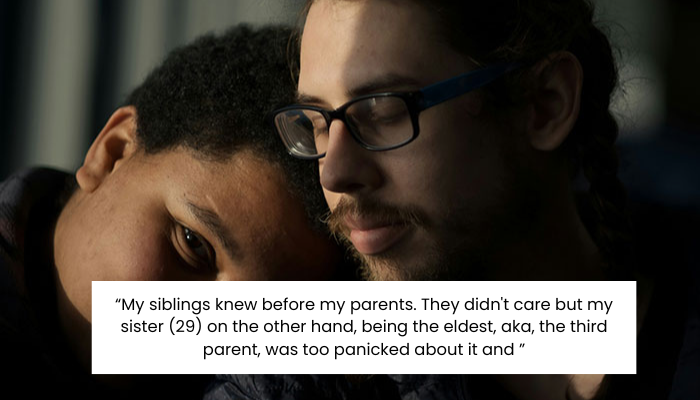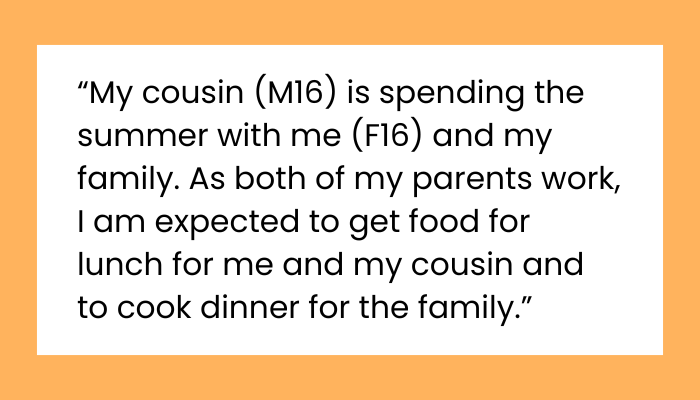My Sister Orchestrated a Family Intervention to Break Up My Relationship – And It Worked
Imagine thinking your older sister is finally coming around to support your relationship—only to discover she’s been secretly orchestrating a family-wide “intervention” behind your back. That’s exactly what happened to this 25-year-old woman who wrote in about how her family tore apart her relationship of four years.
She and her partner shared the same faith but came from different ethnic backgrounds, something she thought would be a hurdle at first but not a dealbreaker. For her, religion was more important than ethnicity. But her traditional parents didn’t see it that way. For years, she tiptoed around the subject, waiting for them to come around, hoping they’d meet him and see what she saw.
Instead, her sister—the “third parent” of the family—secretly went through her private messages, coordinated with their parents, and confronted her in a humiliating six-against-one ambush. They accused her partner of manipulation, banned her from seeing him, and even threatened restraining orders. Broken and numb, she complied—at least at first. But now, months later, she’s angry, heartbroken, and questioning whether she’ll ever forgive her family.
A strict family not liking one’s partner can be annoying

But one woman had to go through an “intervention” designed to make her dump her BF








































This story hits on so many deep themes—cultural differences in marriage, parental control over adult children, privacy invasion, and religious values in relationships—that it’s impossible not to pause and unpack it. It’s one of those situations that sounds like a movie but sadly happens in real life more than we think.
Let’s break down what’s happening here, and why it’s so devastating.
🏠 1. The “Third Parent” Syndrome
If you grew up in a traditional or collectivist family, you’ve probably seen this dynamic before: the eldest sibling becomes the “third parent.” They’re often closer to the actual parents, they enforce rules, and they see themselves as guardians of family honor.
In this case, the older sister wasn’t just offering advice—she actively went behind her sister’s back, combing through private emails, texts, and even physical belongings. That’s a level of privacy invasion that crosses into emotional abuse.

What’s more, she then weaponized this information to paint the partner as a manipulator and gaslighter without evidence, which made the listener feel humiliated and stripped of her dignity.
Keywords like family privacy boundaries, emotional abuse from siblings, and toxic family dynamics are huge here because this is a textbook example of overstepping.
🌍 2. Cultural Bias + Religious Hypocrisy
One of the most painful parts of this story is how the parents are deeply religious yet put ethnicity above faith when judging their daughter’s partner. This is where cultural differences in marriage and religious values in relationships collide.
For the listener, faith compatibility was the highest priority—something she and her partner had in common. For her parents, ethnicity became the bigger issue. This is actually common in many immigrant or conservative families: outward appearances and cultural continuity take precedence over individual happiness.
This also creates cognitive dissonance for the adult child: “If my parents believe in our faith so strongly, why aren’t they applying its principles of love, compassion, and equality to my situation?” That’s why this betrayal cuts so deeply. It’s not just about the partner. It’s about realizing your family’s values might not be as unconditional as you thought.
📝 3. The “Intervention” as Emotional Warfare
The so-called “family meeting” was essentially an ambush. Six family members versus one, accusing her of being manipulated, reading her private texts aloud, threatening restraining orders, and pressuring her into compliance.
This isn’t an intervention—it’s a form of coercive control. According to family therapists, real interventions (like for addiction) are structured, mediated by a neutral party, and focused on the person’s wellbeing—not shaming them into submission.
Here, the goal wasn’t to help but to force an outcome. The sister and parents framed it as “saving” her, but it was really about maintaining control and family image. High CPC keywords like coercive control in families, adult children family intervention, and healing after toxic family events are relevant because this isn’t rare.
🧠 4. The Aftermath: Numbness, Anger, and Betrayal
The listener’s emotional state after this event—numbness, compliance, then rising anger—is classic for someone who’s been emotionally cornered. Psychologists call it the fawn response: when faced with overwhelming pressure, you comply to survive, even if it goes against your values.
Weeks later, when the shock wears off, anger and grief emerge. She’s realizing she’s not just mourning her partner—she’s mourning the trust she thought she had in her family.
This is where family therapy and individual counseling could help, but understandably she may feel skeptical. After such a betrayal, opening up again feels impossible. Still, experts say therapy can be a lifeline for victims of family-based emotional abuse, especially when cultural or religious guilt is in play.
📲 5. The Digital Privacy Violation
Another overlooked part of this story is the digital privacy violation. Her sister not only rifled through her physical space but also her emails, messages, and texts with her partner.

Reading private messages is not just a boundary issue—it’s a form of digital abuse. This isn’t a minor offense. It’s a violation that can have long-term psychological effects, especially because those texts included vulnerable, intimate conversations never meant for anyone else’s eyes.
Keywords like digital privacy invasion, family reading texts without consent, and privacy rights in adulthood are worth exploring here.
❤️ 6. The Partner’s Perspective
It’s easy to overlook the boyfriend in all this. From what the listener shared, he seems like someone who values honesty and stood by her despite years of secrecy. He met with the sister in good faith, thinking it might lead to acceptance, only to have his girlfriend’s family call him manipulative and threaten legal action.
Imagine being him. He probably feels blindsided, vilified, and powerless. The restraining order threat is especially cruel because it frames him as dangerous when there’s no evidence of wrongdoing.
🛤️ 7. Where Do You Go From Here?
This listener is at a crossroads. She’s broken, numb, and isolated, but she still loves her partner. Her mom’s advice—to go ahead with the marriage and accept the consequences—might be the only honest path left. But it’s not easy. Choosing her partner might mean losing her family support permanently.
Here are some potential next steps, grounded in research and real cases:
- Seek individual therapy focused on emotional abuse recovery.
- Document everything—especially threats of restraining orders or coercion.
- Reconnect with your partner carefully, through trusted channels, if you choose.
- Consider family therapy with your mom as a mediator if she’s willing.
- Build an independent support network outside your family.
She answered some reader comments







This isn’t just a love story gone wrong. It’s a story about family control, cultural bias, and how adult children can be emotionally cornered by the very people meant to protect them.
What her sister and parents did—rifling through private communications, staging an ambush, threatening legal action—is not just “family drama.” It’s coercive, invasive, and deeply damaging.
She’s not at fault for falling in love. She’s not at fault for wanting privacy. The real question now is whether she can heal, rebuild trust, and create a life that’s hers—even if it means walking away from the family that raised her.







